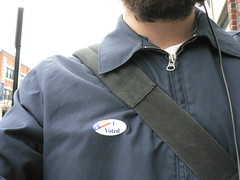It was encouraging to see the Domestic Policy Council's Heather Higginbottom say in a White House chat last week that the Obama administration is supportive of a federal law restoring ex-felons' voting rights. The messy patchwork of laws we currently have for the once-incarcerated is one of the least appealing aspects of the modern American practice of democracy. It doesn't have to be this way.
Elections are, of course, largely state affairs in the U.S., by history and by the fact that people would freak if we threatened that. But the way that the ex-felons are treated on Election Day isn't right -- all the more so because it varies so wildly from state to state. Take Maine. There, you can vote from your prison cell. But if you sold the same amount of marijuana in Florida, you'll most likely never vote again. Even after you've formally repaid what society has said is the debt incurred by your crime. According to the Sentencing Project, 35 states prohibit the once-incarcerated from voting while they are on parole. All but five of them also prevent felons from voting while on probation.
We end up with broken places like Providence, Rhode Island, where 1 in 5 black men there can't vote, according to a 2004 report. We incarcerate so many people that in the U.S. as a whole, 13 percent of black men can't vote. That's a problem for everything from representative democracy to the damage it does to how these men and women (and others like them) think about themselves, their communities, and their country.
Now, the political optics of restoring the right to vote to former felons through a federal law are obviously, well, pretty challenging. But I do think that a supremely talented politician could convincingly lay out the case and come away with a historic civil-rights win. Anyone know of one?
-- Nancy Scola
(Photo credit: iandavid)




